Legislation and Ethics in the Travel and Tourism Sector: A Report
VerifiedAdded on 2020/10/22
|13
|4607
|120
Report
AI Summary
This report comprehensively examines the legal and ethical dimensions of the travel and tourism sector. It begins with an introduction to legislation and ethics, emphasizing their importance in the industry. The report then delves into the legal and regulatory framework of the English legal system, outlining the sources of UK law, including legislation, common law, European law, and the European Convention on Human Rights, alongside the court system. It explores the role of regulatory bodies in transport, including surface, sea, and air transport, and the relevant legislation governing each. The report further analyses the impact of health, safety, and security legislation, such as the Health and Safety at Work Act, and data protection laws, on the travel and tourism sector. It also covers equality legislation, including the Human Rights Act and the Equality Act, in the context of recruiting and managing employees. The report then moves on to contract laws and consumer protection legislation, emphasizing the importance of avoiding civil and criminal liability. Finally, it addresses ethical dilemmas faced by organizations, corporate social responsibility, and provides a conclusion summarizing the key findings and references.
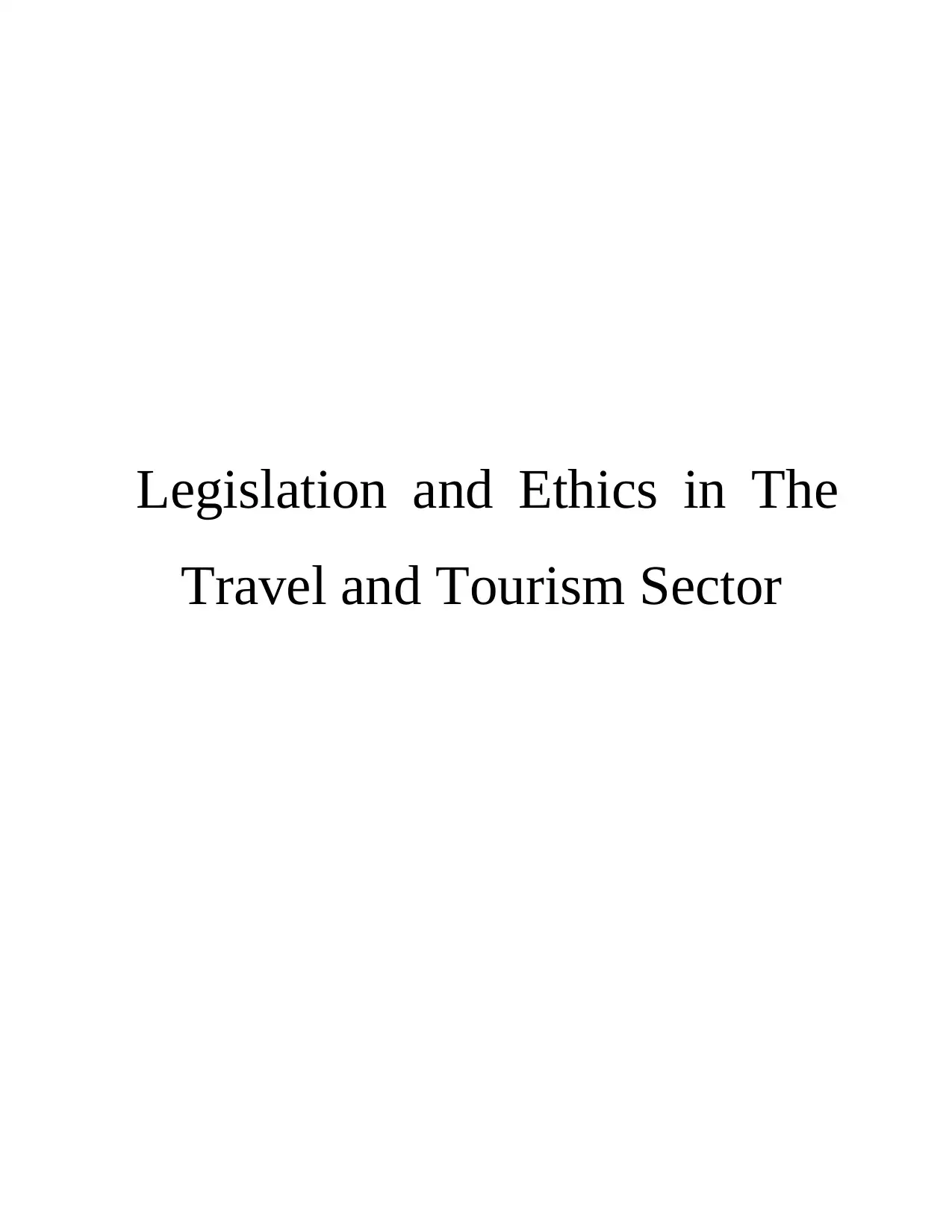
Legislation and Ethics in The
Travel and Tourism Sector
Travel and Tourism Sector
Paraphrase This Document
Need a fresh take? Get an instant paraphrase of this document with our AI Paraphraser
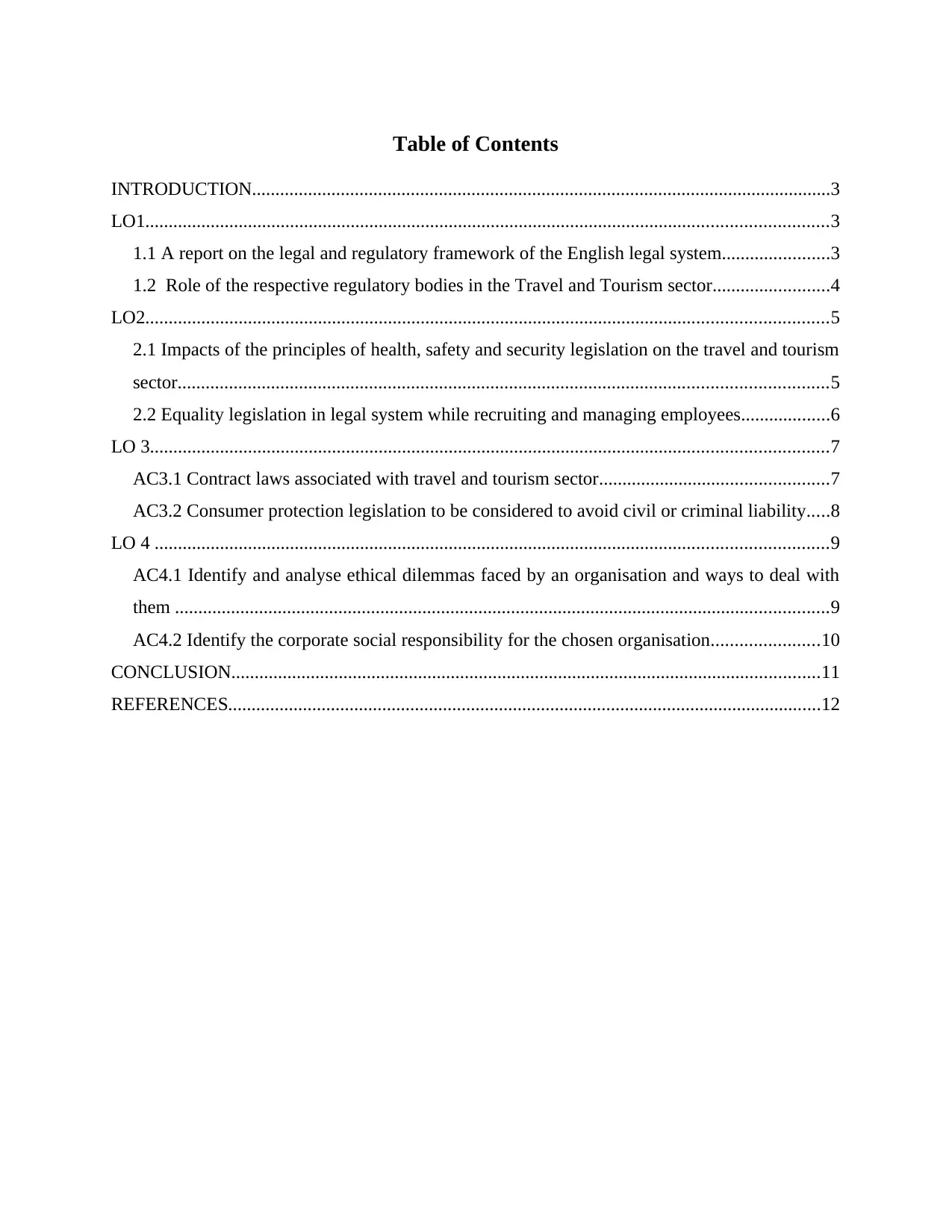
Table of Contents
INTRODUCTION............................................................................................................................3
LO1..................................................................................................................................................3
1.1 A report on the legal and regulatory framework of the English legal system.......................3
1.2 Role of the respective regulatory bodies in the Travel and Tourism sector.........................4
LO2..................................................................................................................................................5
2.1 Impacts of the principles of health, safety and security legislation on the travel and tourism
sector...........................................................................................................................................5
2.2 Equality legislation in legal system while recruiting and managing employees...................6
LO 3.................................................................................................................................................7
AC3.1 Contract laws associated with travel and tourism sector.................................................7
AC3.2 Consumer protection legislation to be considered to avoid civil or criminal liability.....8
LO 4 ................................................................................................................................................9
AC4.1 Identify and analyse ethical dilemmas faced by an organisation and ways to deal with
them ............................................................................................................................................9
AC4.2 Identify the corporate social responsibility for the chosen organisation.......................10
CONCLUSION..............................................................................................................................11
REFERENCES...............................................................................................................................12
INTRODUCTION............................................................................................................................3
LO1..................................................................................................................................................3
1.1 A report on the legal and regulatory framework of the English legal system.......................3
1.2 Role of the respective regulatory bodies in the Travel and Tourism sector.........................4
LO2..................................................................................................................................................5
2.1 Impacts of the principles of health, safety and security legislation on the travel and tourism
sector...........................................................................................................................................5
2.2 Equality legislation in legal system while recruiting and managing employees...................6
LO 3.................................................................................................................................................7
AC3.1 Contract laws associated with travel and tourism sector.................................................7
AC3.2 Consumer protection legislation to be considered to avoid civil or criminal liability.....8
LO 4 ................................................................................................................................................9
AC4.1 Identify and analyse ethical dilemmas faced by an organisation and ways to deal with
them ............................................................................................................................................9
AC4.2 Identify the corporate social responsibility for the chosen organisation.......................10
CONCLUSION..............................................................................................................................11
REFERENCES...............................................................................................................................12
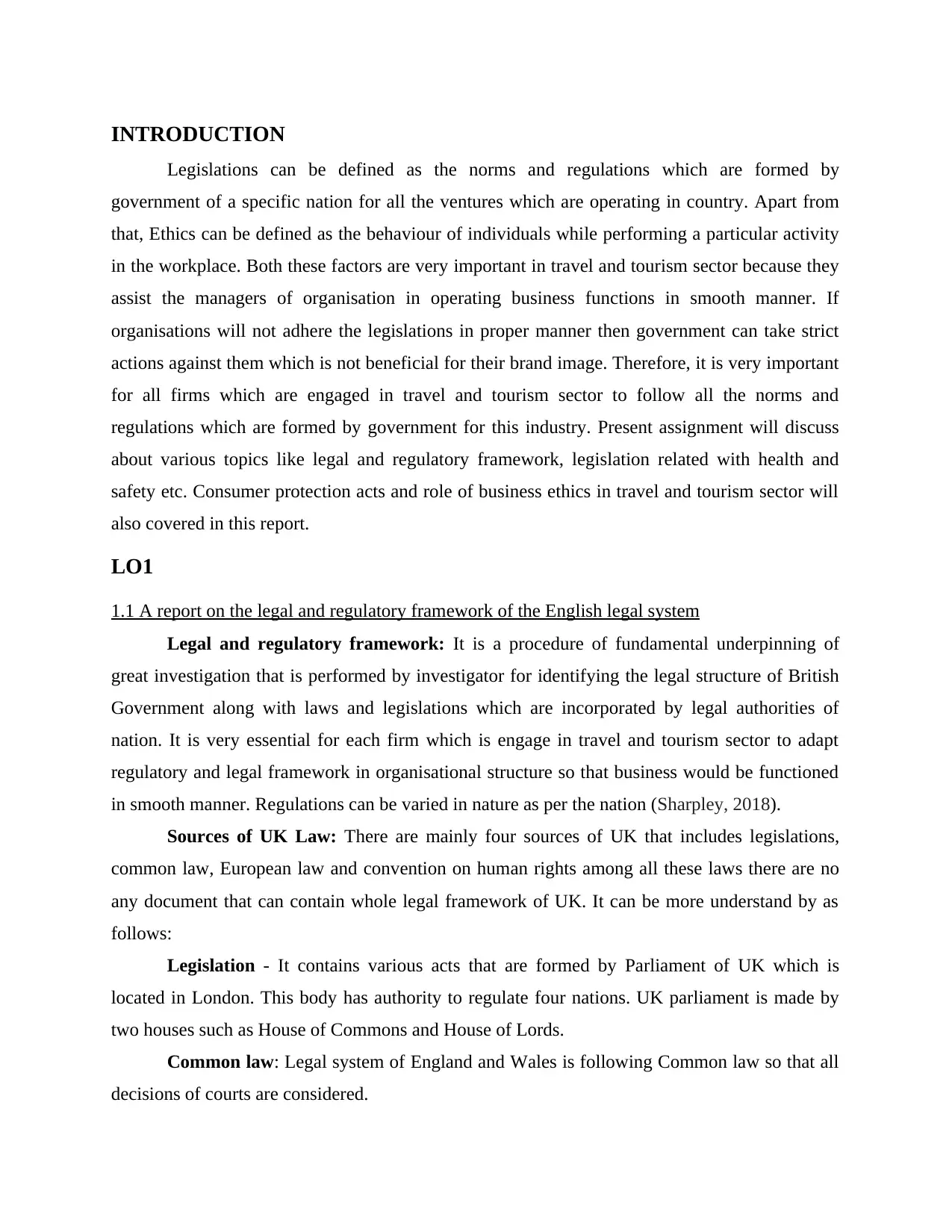
INTRODUCTION
Legislations can be defined as the norms and regulations which are formed by
government of a specific nation for all the ventures which are operating in country. Apart from
that, Ethics can be defined as the behaviour of individuals while performing a particular activity
in the workplace. Both these factors are very important in travel and tourism sector because they
assist the managers of organisation in operating business functions in smooth manner. If
organisations will not adhere the legislations in proper manner then government can take strict
actions against them which is not beneficial for their brand image. Therefore, it is very important
for all firms which are engaged in travel and tourism sector to follow all the norms and
regulations which are formed by government for this industry. Present assignment will discuss
about various topics like legal and regulatory framework, legislation related with health and
safety etc. Consumer protection acts and role of business ethics in travel and tourism sector will
also covered in this report.
LO1
1.1 A report on the legal and regulatory framework of the English legal system
Legal and regulatory framework: It is a procedure of fundamental underpinning of
great investigation that is performed by investigator for identifying the legal structure of British
Government along with laws and legislations which are incorporated by legal authorities of
nation. It is very essential for each firm which is engage in travel and tourism sector to adapt
regulatory and legal framework in organisational structure so that business would be functioned
in smooth manner. Regulations can be varied in nature as per the nation (Sharpley, 2018).
Sources of UK Law: There are mainly four sources of UK that includes legislations,
common law, European law and convention on human rights among all these laws there are no
any document that can contain whole legal framework of UK. It can be more understand by as
follows:
Legislation - It contains various acts that are formed by Parliament of UK which is
located in London. This body has authority to regulate four nations. UK parliament is made by
two houses such as House of Commons and House of Lords.
Common law: Legal system of England and Wales is following Common law so that all
decisions of courts are considered.
Legislations can be defined as the norms and regulations which are formed by
government of a specific nation for all the ventures which are operating in country. Apart from
that, Ethics can be defined as the behaviour of individuals while performing a particular activity
in the workplace. Both these factors are very important in travel and tourism sector because they
assist the managers of organisation in operating business functions in smooth manner. If
organisations will not adhere the legislations in proper manner then government can take strict
actions against them which is not beneficial for their brand image. Therefore, it is very important
for all firms which are engaged in travel and tourism sector to follow all the norms and
regulations which are formed by government for this industry. Present assignment will discuss
about various topics like legal and regulatory framework, legislation related with health and
safety etc. Consumer protection acts and role of business ethics in travel and tourism sector will
also covered in this report.
LO1
1.1 A report on the legal and regulatory framework of the English legal system
Legal and regulatory framework: It is a procedure of fundamental underpinning of
great investigation that is performed by investigator for identifying the legal structure of British
Government along with laws and legislations which are incorporated by legal authorities of
nation. It is very essential for each firm which is engage in travel and tourism sector to adapt
regulatory and legal framework in organisational structure so that business would be functioned
in smooth manner. Regulations can be varied in nature as per the nation (Sharpley, 2018).
Sources of UK Law: There are mainly four sources of UK that includes legislations,
common law, European law and convention on human rights among all these laws there are no
any document that can contain whole legal framework of UK. It can be more understand by as
follows:
Legislation - It contains various acts that are formed by Parliament of UK which is
located in London. This body has authority to regulate four nations. UK parliament is made by
two houses such as House of Commons and House of Lords.
Common law: Legal system of England and Wales is following Common law so that all
decisions of courts are considered.
⊘ This is a preview!⊘
Do you want full access?
Subscribe today to unlock all pages.

Trusted by 1+ million students worldwide
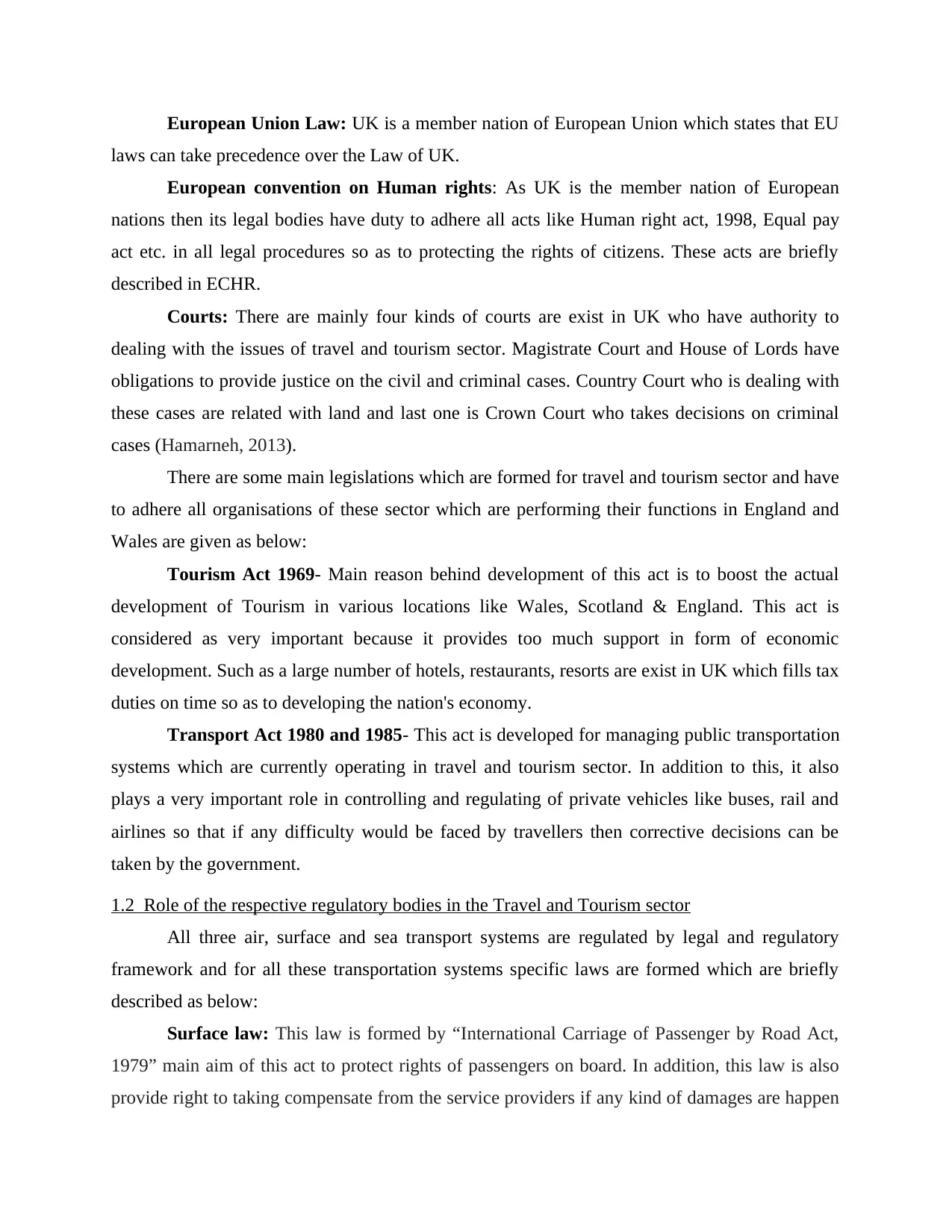
European Union Law: UK is a member nation of European Union which states that EU
laws can take precedence over the Law of UK.
European convention on Human rights: As UK is the member nation of European
nations then its legal bodies have duty to adhere all acts like Human right act, 1998, Equal pay
act etc. in all legal procedures so as to protecting the rights of citizens. These acts are briefly
described in ECHR.
Courts: There are mainly four kinds of courts are exist in UK who have authority to
dealing with the issues of travel and tourism sector. Magistrate Court and House of Lords have
obligations to provide justice on the civil and criminal cases. Country Court who is dealing with
these cases are related with land and last one is Crown Court who takes decisions on criminal
cases (Hamarneh, 2013).
There are some main legislations which are formed for travel and tourism sector and have
to adhere all organisations of these sector which are performing their functions in England and
Wales are given as below:
Tourism Act 1969- Main reason behind development of this act is to boost the actual
development of Tourism in various locations like Wales, Scotland & England. This act is
considered as very important because it provides too much support in form of economic
development. Such as a large number of hotels, restaurants, resorts are exist in UK which fills tax
duties on time so as to developing the nation's economy.
Transport Act 1980 and 1985- This act is developed for managing public transportation
systems which are currently operating in travel and tourism sector. In addition to this, it also
plays a very important role in controlling and regulating of private vehicles like buses, rail and
airlines so that if any difficulty would be faced by travellers then corrective decisions can be
taken by the government.
1.2 Role of the respective regulatory bodies in the Travel and Tourism sector
All three air, surface and sea transport systems are regulated by legal and regulatory
framework and for all these transportation systems specific laws are formed which are briefly
described as below:
Surface law: This law is formed by “International Carriage of Passenger by Road Act,
1979” main aim of this act to protect rights of passengers on board. In addition, this law is also
provide right to taking compensate from the service providers if any kind of damages are happen
laws can take precedence over the Law of UK.
European convention on Human rights: As UK is the member nation of European
nations then its legal bodies have duty to adhere all acts like Human right act, 1998, Equal pay
act etc. in all legal procedures so as to protecting the rights of citizens. These acts are briefly
described in ECHR.
Courts: There are mainly four kinds of courts are exist in UK who have authority to
dealing with the issues of travel and tourism sector. Magistrate Court and House of Lords have
obligations to provide justice on the civil and criminal cases. Country Court who is dealing with
these cases are related with land and last one is Crown Court who takes decisions on criminal
cases (Hamarneh, 2013).
There are some main legislations which are formed for travel and tourism sector and have
to adhere all organisations of these sector which are performing their functions in England and
Wales are given as below:
Tourism Act 1969- Main reason behind development of this act is to boost the actual
development of Tourism in various locations like Wales, Scotland & England. This act is
considered as very important because it provides too much support in form of economic
development. Such as a large number of hotels, restaurants, resorts are exist in UK which fills tax
duties on time so as to developing the nation's economy.
Transport Act 1980 and 1985- This act is developed for managing public transportation
systems which are currently operating in travel and tourism sector. In addition to this, it also
plays a very important role in controlling and regulating of private vehicles like buses, rail and
airlines so that if any difficulty would be faced by travellers then corrective decisions can be
taken by the government.
1.2 Role of the respective regulatory bodies in the Travel and Tourism sector
All three air, surface and sea transport systems are regulated by legal and regulatory
framework and for all these transportation systems specific laws are formed which are briefly
described as below:
Surface law: This law is formed by “International Carriage of Passenger by Road Act,
1979” main aim of this act to protect rights of passengers on board. In addition, this law is also
provide right to taking compensate from the service providers if any kind of damages are happen
Paraphrase This Document
Need a fresh take? Get an instant paraphrase of this document with our AI Paraphraser
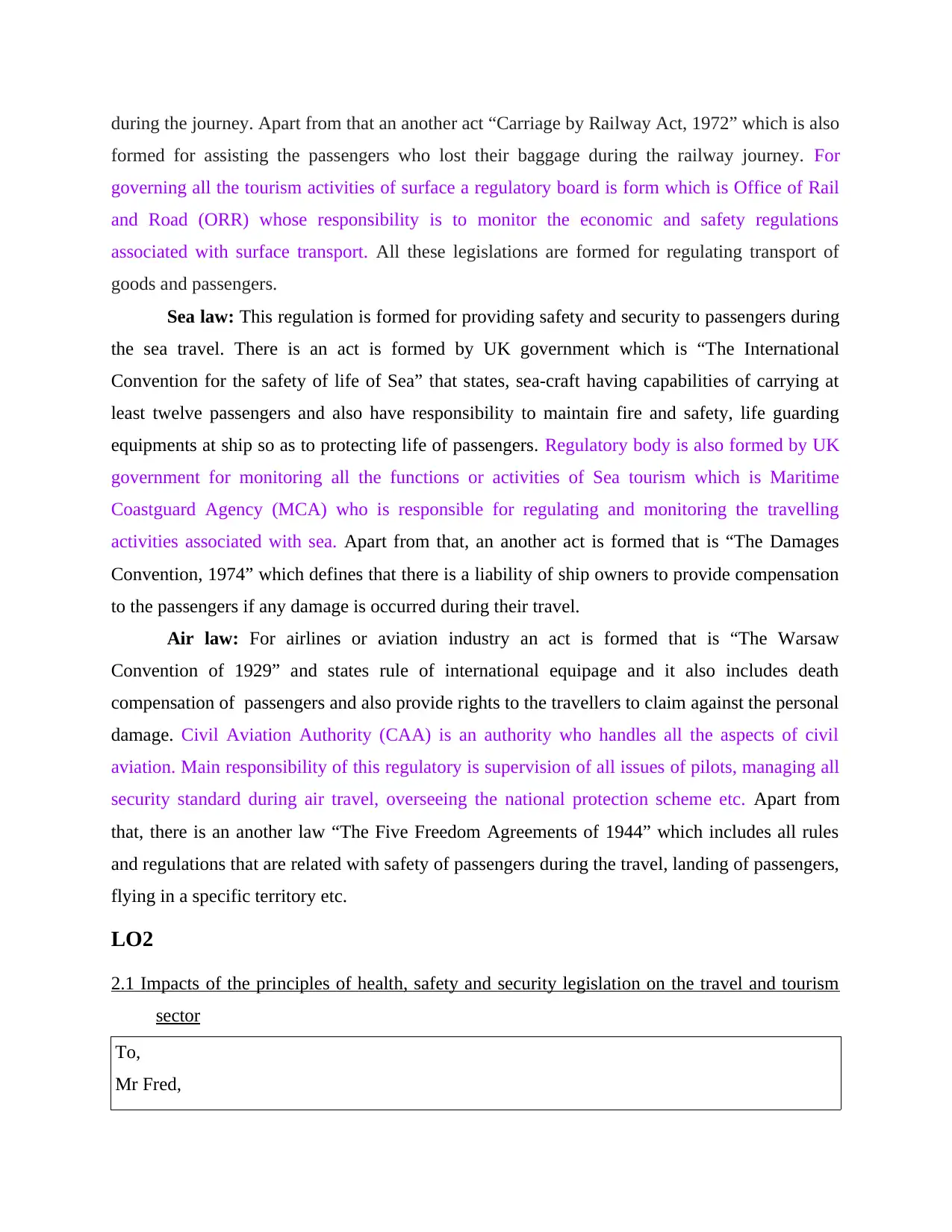
during the journey. Apart from that an another act “Carriage by Railway Act, 1972” which is also
formed for assisting the passengers who lost their baggage during the railway journey. For
governing all the tourism activities of surface a regulatory board is form which is Office of Rail
and Road (ORR) whose responsibility is to monitor the economic and safety regulations
associated with surface transport. All these legislations are formed for regulating transport of
goods and passengers.
Sea law: This regulation is formed for providing safety and security to passengers during
the sea travel. There is an act is formed by UK government which is “The International
Convention for the safety of life of Sea” that states, sea-craft having capabilities of carrying at
least twelve passengers and also have responsibility to maintain fire and safety, life guarding
equipments at ship so as to protecting life of passengers. Regulatory body is also formed by UK
government for monitoring all the functions or activities of Sea tourism which is Maritime
Coastguard Agency (MCA) who is responsible for regulating and monitoring the travelling
activities associated with sea. Apart from that, an another act is formed that is “The Damages
Convention, 1974” which defines that there is a liability of ship owners to provide compensation
to the passengers if any damage is occurred during their travel.
Air law: For airlines or aviation industry an act is formed that is “The Warsaw
Convention of 1929” and states rule of international equipage and it also includes death
compensation of passengers and also provide rights to the travellers to claim against the personal
damage. Civil Aviation Authority (CAA) is an authority who handles all the aspects of civil
aviation. Main responsibility of this regulatory is supervision of all issues of pilots, managing all
security standard during air travel, overseeing the national protection scheme etc. Apart from
that, there is an another law “The Five Freedom Agreements of 1944” which includes all rules
and regulations that are related with safety of passengers during the travel, landing of passengers,
flying in a specific territory etc.
LO2
2.1 Impacts of the principles of health, safety and security legislation on the travel and tourism
sector
To,
Mr Fred,
formed for assisting the passengers who lost their baggage during the railway journey. For
governing all the tourism activities of surface a regulatory board is form which is Office of Rail
and Road (ORR) whose responsibility is to monitor the economic and safety regulations
associated with surface transport. All these legislations are formed for regulating transport of
goods and passengers.
Sea law: This regulation is formed for providing safety and security to passengers during
the sea travel. There is an act is formed by UK government which is “The International
Convention for the safety of life of Sea” that states, sea-craft having capabilities of carrying at
least twelve passengers and also have responsibility to maintain fire and safety, life guarding
equipments at ship so as to protecting life of passengers. Regulatory body is also formed by UK
government for monitoring all the functions or activities of Sea tourism which is Maritime
Coastguard Agency (MCA) who is responsible for regulating and monitoring the travelling
activities associated with sea. Apart from that, an another act is formed that is “The Damages
Convention, 1974” which defines that there is a liability of ship owners to provide compensation
to the passengers if any damage is occurred during their travel.
Air law: For airlines or aviation industry an act is formed that is “The Warsaw
Convention of 1929” and states rule of international equipage and it also includes death
compensation of passengers and also provide rights to the travellers to claim against the personal
damage. Civil Aviation Authority (CAA) is an authority who handles all the aspects of civil
aviation. Main responsibility of this regulatory is supervision of all issues of pilots, managing all
security standard during air travel, overseeing the national protection scheme etc. Apart from
that, there is an another law “The Five Freedom Agreements of 1944” which includes all rules
and regulations that are related with safety of passengers during the travel, landing of passengers,
flying in a specific territory etc.
LO2
2.1 Impacts of the principles of health, safety and security legislation on the travel and tourism
sector
To,
Mr Fred,
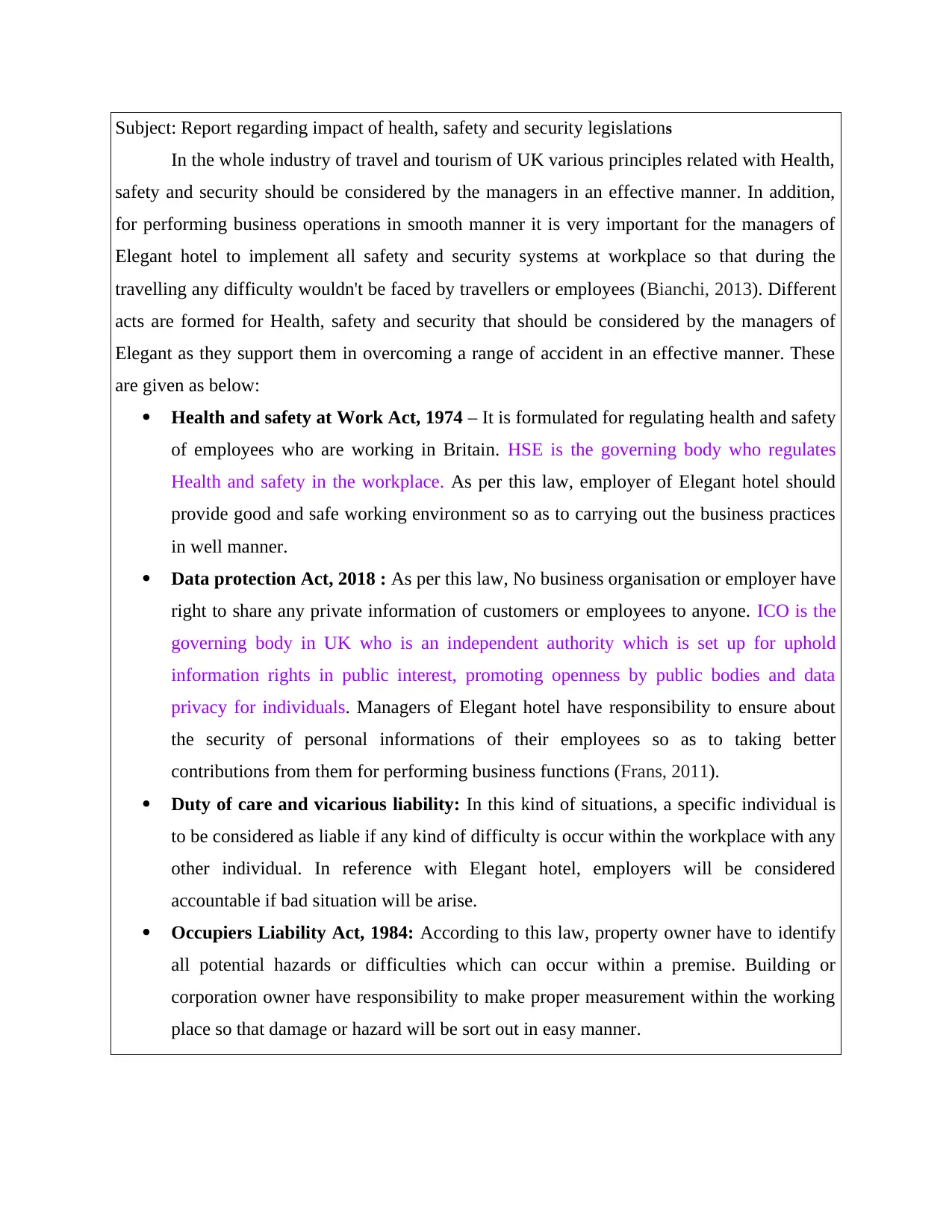
Subject: Report regarding impact of health, safety and security legislations
In the whole industry of travel and tourism of UK various principles related with Health,
safety and security should be considered by the managers in an effective manner. In addition,
for performing business operations in smooth manner it is very important for the managers of
Elegant hotel to implement all safety and security systems at workplace so that during the
travelling any difficulty wouldn't be faced by travellers or employees (Bianchi, 2013). Different
acts are formed for Health, safety and security that should be considered by the managers of
Elegant as they support them in overcoming a range of accident in an effective manner. These
are given as below:
Health and safety at Work Act, 1974 – It is formulated for regulating health and safety
of employees who are working in Britain. HSE is the governing body who regulates
Health and safety in the workplace. As per this law, employer of Elegant hotel should
provide good and safe working environment so as to carrying out the business practices
in well manner.
Data protection Act, 2018 : As per this law, No business organisation or employer have
right to share any private information of customers or employees to anyone. ICO is the
governing body in UK who is an independent authority which is set up for uphold
information rights in public interest, promoting openness by public bodies and data
privacy for individuals. Managers of Elegant hotel have responsibility to ensure about
the security of personal informations of their employees so as to taking better
contributions from them for performing business functions (Frans, 2011).
Duty of care and vicarious liability: In this kind of situations, a specific individual is
to be considered as liable if any kind of difficulty is occur within the workplace with any
other individual. In reference with Elegant hotel, employers will be considered
accountable if bad situation will be arise.
Occupiers Liability Act, 1984: According to this law, property owner have to identify
all potential hazards or difficulties which can occur within a premise. Building or
corporation owner have responsibility to make proper measurement within the working
place so that damage or hazard will be sort out in easy manner.
In the whole industry of travel and tourism of UK various principles related with Health,
safety and security should be considered by the managers in an effective manner. In addition,
for performing business operations in smooth manner it is very important for the managers of
Elegant hotel to implement all safety and security systems at workplace so that during the
travelling any difficulty wouldn't be faced by travellers or employees (Bianchi, 2013). Different
acts are formed for Health, safety and security that should be considered by the managers of
Elegant as they support them in overcoming a range of accident in an effective manner. These
are given as below:
Health and safety at Work Act, 1974 – It is formulated for regulating health and safety
of employees who are working in Britain. HSE is the governing body who regulates
Health and safety in the workplace. As per this law, employer of Elegant hotel should
provide good and safe working environment so as to carrying out the business practices
in well manner.
Data protection Act, 2018 : As per this law, No business organisation or employer have
right to share any private information of customers or employees to anyone. ICO is the
governing body in UK who is an independent authority which is set up for uphold
information rights in public interest, promoting openness by public bodies and data
privacy for individuals. Managers of Elegant hotel have responsibility to ensure about
the security of personal informations of their employees so as to taking better
contributions from them for performing business functions (Frans, 2011).
Duty of care and vicarious liability: In this kind of situations, a specific individual is
to be considered as liable if any kind of difficulty is occur within the workplace with any
other individual. In reference with Elegant hotel, employers will be considered
accountable if bad situation will be arise.
Occupiers Liability Act, 1984: According to this law, property owner have to identify
all potential hazards or difficulties which can occur within a premise. Building or
corporation owner have responsibility to make proper measurement within the working
place so that damage or hazard will be sort out in easy manner.
⊘ This is a preview!⊘
Do you want full access?
Subscribe today to unlock all pages.

Trusted by 1+ million students worldwide
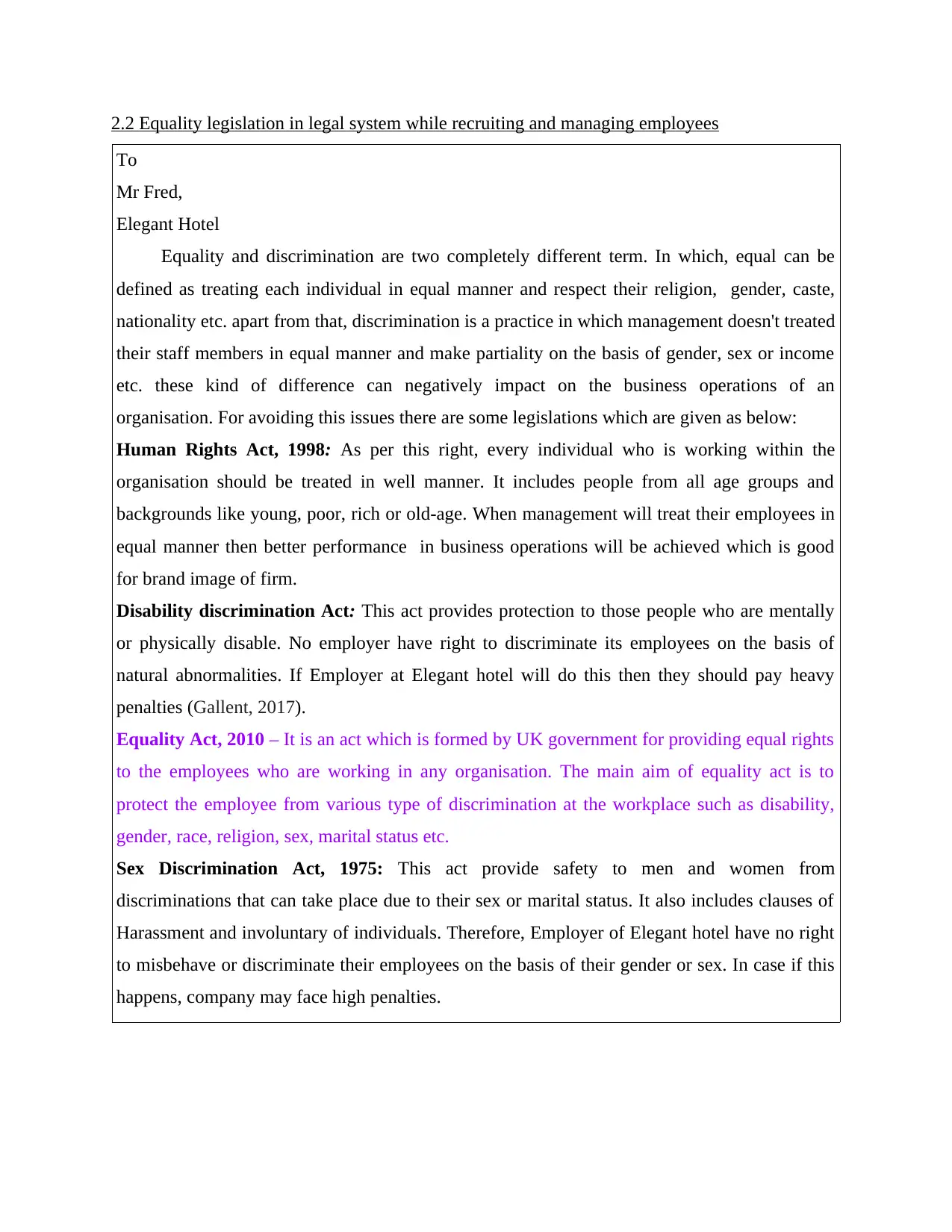
2.2 Equality legislation in legal system while recruiting and managing employees
To
Mr Fred,
Elegant Hotel
Equality and discrimination are two completely different term. In which, equal can be
defined as treating each individual in equal manner and respect their religion, gender, caste,
nationality etc. apart from that, discrimination is a practice in which management doesn't treated
their staff members in equal manner and make partiality on the basis of gender, sex or income
etc. these kind of difference can negatively impact on the business operations of an
organisation. For avoiding this issues there are some legislations which are given as below:
Human Rights Act, 1998: As per this right, every individual who is working within the
organisation should be treated in well manner. It includes people from all age groups and
backgrounds like young, poor, rich or old-age. When management will treat their employees in
equal manner then better performance in business operations will be achieved which is good
for brand image of firm.
Disability discrimination Act: This act provides protection to those people who are mentally
or physically disable. No employer have right to discriminate its employees on the basis of
natural abnormalities. If Employer at Elegant hotel will do this then they should pay heavy
penalties (Gallent, 2017).
Equality Act, 2010 – It is an act which is formed by UK government for providing equal rights
to the employees who are working in any organisation. The main aim of equality act is to
protect the employee from various type of discrimination at the workplace such as disability,
gender, race, religion, sex, marital status etc.
Sex Discrimination Act, 1975: This act provide safety to men and women from
discriminations that can take place due to their sex or marital status. It also includes clauses of
Harassment and involuntary of individuals. Therefore, Employer of Elegant hotel have no right
to misbehave or discriminate their employees on the basis of their gender or sex. In case if this
happens, company may face high penalties.
To
Mr Fred,
Elegant Hotel
Equality and discrimination are two completely different term. In which, equal can be
defined as treating each individual in equal manner and respect their religion, gender, caste,
nationality etc. apart from that, discrimination is a practice in which management doesn't treated
their staff members in equal manner and make partiality on the basis of gender, sex or income
etc. these kind of difference can negatively impact on the business operations of an
organisation. For avoiding this issues there are some legislations which are given as below:
Human Rights Act, 1998: As per this right, every individual who is working within the
organisation should be treated in well manner. It includes people from all age groups and
backgrounds like young, poor, rich or old-age. When management will treat their employees in
equal manner then better performance in business operations will be achieved which is good
for brand image of firm.
Disability discrimination Act: This act provides protection to those people who are mentally
or physically disable. No employer have right to discriminate its employees on the basis of
natural abnormalities. If Employer at Elegant hotel will do this then they should pay heavy
penalties (Gallent, 2017).
Equality Act, 2010 – It is an act which is formed by UK government for providing equal rights
to the employees who are working in any organisation. The main aim of equality act is to
protect the employee from various type of discrimination at the workplace such as disability,
gender, race, religion, sex, marital status etc.
Sex Discrimination Act, 1975: This act provide safety to men and women from
discriminations that can take place due to their sex or marital status. It also includes clauses of
Harassment and involuntary of individuals. Therefore, Employer of Elegant hotel have no right
to misbehave or discriminate their employees on the basis of their gender or sex. In case if this
happens, company may face high penalties.
Paraphrase This Document
Need a fresh take? Get an instant paraphrase of this document with our AI Paraphraser
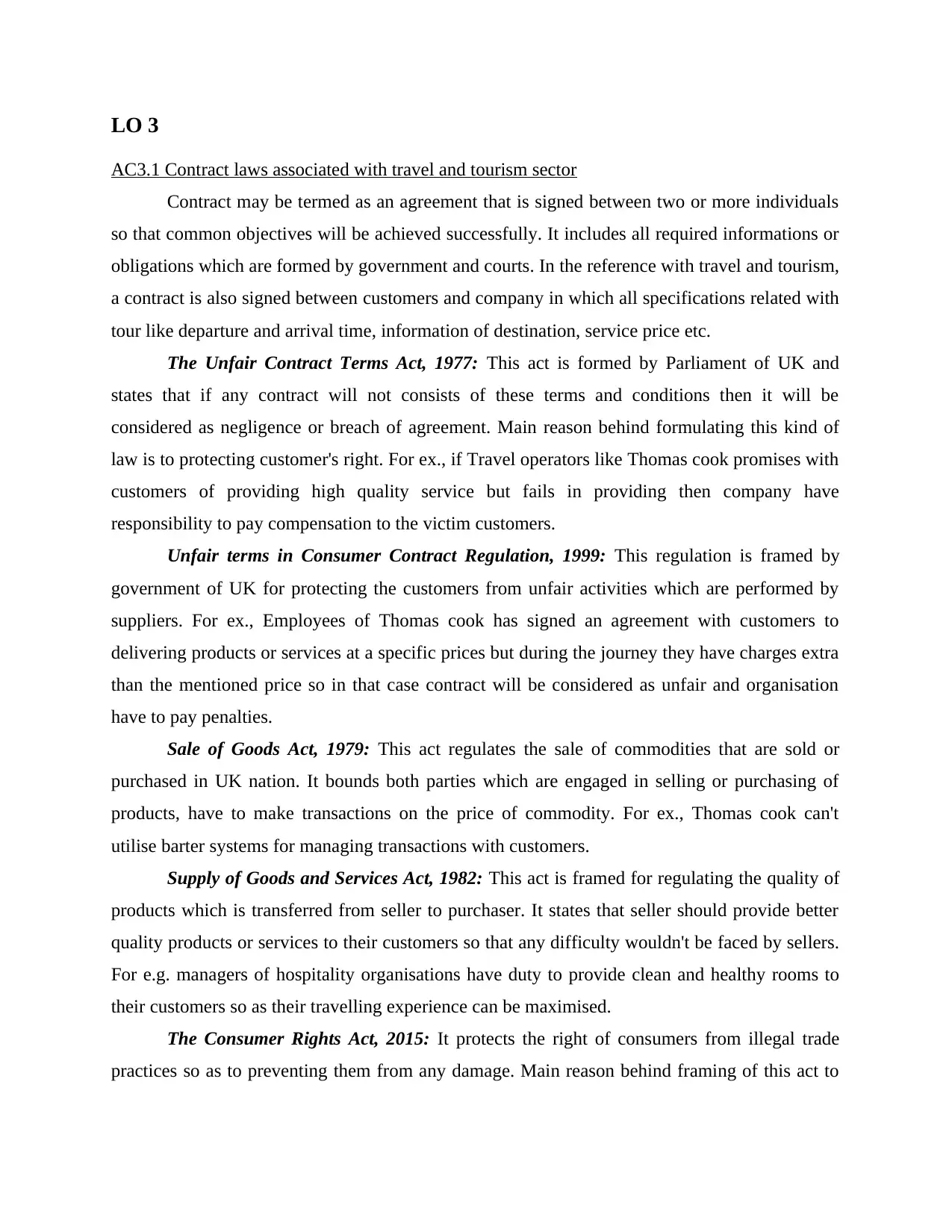
LO 3
AC3.1 Contract laws associated with travel and tourism sector
Contract may be termed as an agreement that is signed between two or more individuals
so that common objectives will be achieved successfully. It includes all required informations or
obligations which are formed by government and courts. In the reference with travel and tourism,
a contract is also signed between customers and company in which all specifications related with
tour like departure and arrival time, information of destination, service price etc.
The Unfair Contract Terms Act, 1977: This act is formed by Parliament of UK and
states that if any contract will not consists of these terms and conditions then it will be
considered as negligence or breach of agreement. Main reason behind formulating this kind of
law is to protecting customer's right. For ex., if Travel operators like Thomas cook promises with
customers of providing high quality service but fails in providing then company have
responsibility to pay compensation to the victim customers.
Unfair terms in Consumer Contract Regulation, 1999: This regulation is framed by
government of UK for protecting the customers from unfair activities which are performed by
suppliers. For ex., Employees of Thomas cook has signed an agreement with customers to
delivering products or services at a specific prices but during the journey they have charges extra
than the mentioned price so in that case contract will be considered as unfair and organisation
have to pay penalties.
Sale of Goods Act, 1979: This act regulates the sale of commodities that are sold or
purchased in UK nation. It bounds both parties which are engaged in selling or purchasing of
products, have to make transactions on the price of commodity. For ex., Thomas cook can't
utilise barter systems for managing transactions with customers.
Supply of Goods and Services Act, 1982: This act is framed for regulating the quality of
products which is transferred from seller to purchaser. It states that seller should provide better
quality products or services to their customers so that any difficulty wouldn't be faced by sellers.
For e.g. managers of hospitality organisations have duty to provide clean and healthy rooms to
their customers so as their travelling experience can be maximised.
The Consumer Rights Act, 2015: It protects the right of consumers from illegal trade
practices so as to preventing them from any damage. Main reason behind framing of this act to
AC3.1 Contract laws associated with travel and tourism sector
Contract may be termed as an agreement that is signed between two or more individuals
so that common objectives will be achieved successfully. It includes all required informations or
obligations which are formed by government and courts. In the reference with travel and tourism,
a contract is also signed between customers and company in which all specifications related with
tour like departure and arrival time, information of destination, service price etc.
The Unfair Contract Terms Act, 1977: This act is formed by Parliament of UK and
states that if any contract will not consists of these terms and conditions then it will be
considered as negligence or breach of agreement. Main reason behind formulating this kind of
law is to protecting customer's right. For ex., if Travel operators like Thomas cook promises with
customers of providing high quality service but fails in providing then company have
responsibility to pay compensation to the victim customers.
Unfair terms in Consumer Contract Regulation, 1999: This regulation is framed by
government of UK for protecting the customers from unfair activities which are performed by
suppliers. For ex., Employees of Thomas cook has signed an agreement with customers to
delivering products or services at a specific prices but during the journey they have charges extra
than the mentioned price so in that case contract will be considered as unfair and organisation
have to pay penalties.
Sale of Goods Act, 1979: This act regulates the sale of commodities that are sold or
purchased in UK nation. It bounds both parties which are engaged in selling or purchasing of
products, have to make transactions on the price of commodity. For ex., Thomas cook can't
utilise barter systems for managing transactions with customers.
Supply of Goods and Services Act, 1982: This act is framed for regulating the quality of
products which is transferred from seller to purchaser. It states that seller should provide better
quality products or services to their customers so that any difficulty wouldn't be faced by sellers.
For e.g. managers of hospitality organisations have duty to provide clean and healthy rooms to
their customers so as their travelling experience can be maximised.
The Consumer Rights Act, 2015: It protects the right of consumers from illegal trade
practices so as to preventing them from any damage. Main reason behind framing of this act to
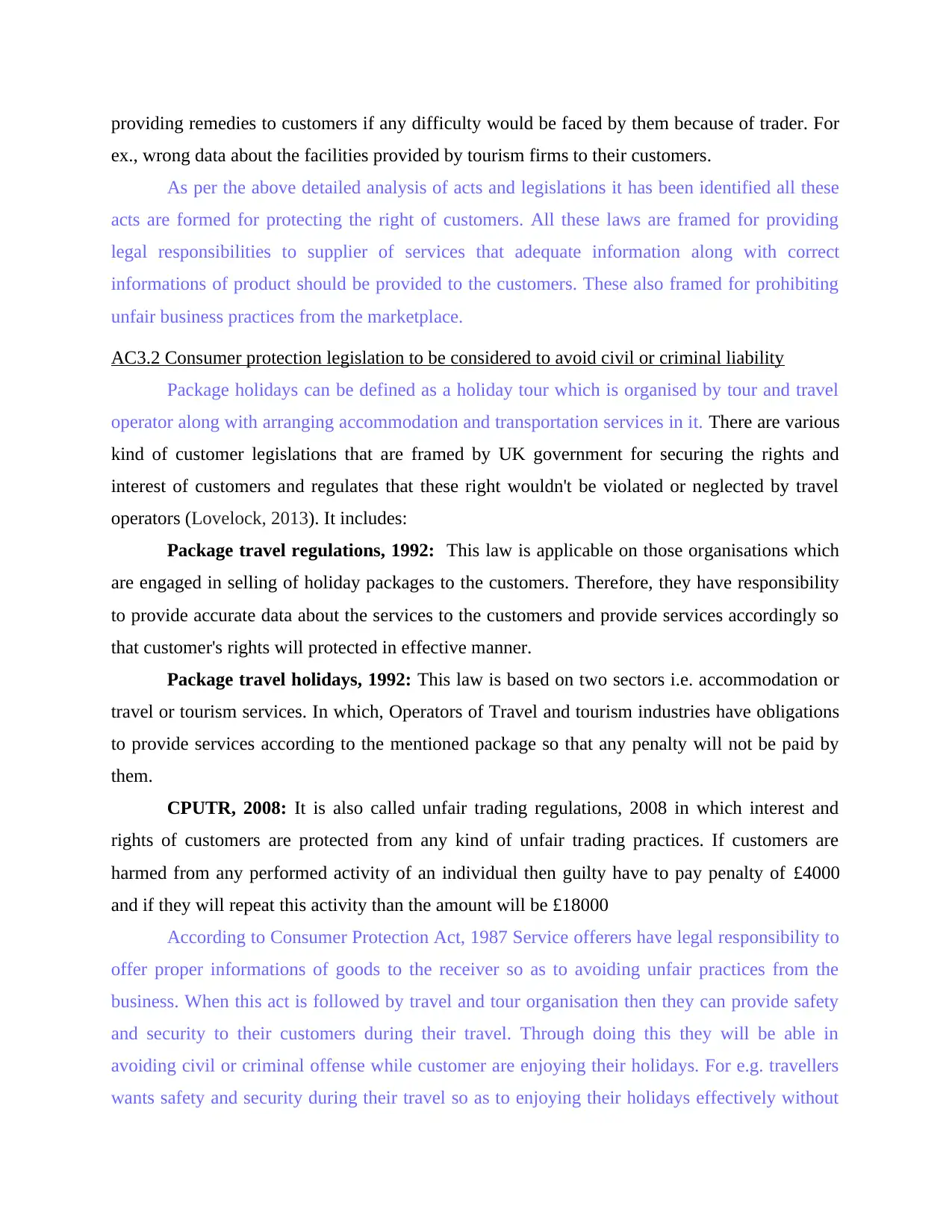
providing remedies to customers if any difficulty would be faced by them because of trader. For
ex., wrong data about the facilities provided by tourism firms to their customers.
As per the above detailed analysis of acts and legislations it has been identified all these
acts are formed for protecting the right of customers. All these laws are framed for providing
legal responsibilities to supplier of services that adequate information along with correct
informations of product should be provided to the customers. These also framed for prohibiting
unfair business practices from the marketplace.
AC3.2 Consumer protection legislation to be considered to avoid civil or criminal liability
Package holidays can be defined as a holiday tour which is organised by tour and travel
operator along with arranging accommodation and transportation services in it. There are various
kind of customer legislations that are framed by UK government for securing the rights and
interest of customers and regulates that these right wouldn't be violated or neglected by travel
operators (Lovelock, 2013). It includes:
Package travel regulations, 1992: This law is applicable on those organisations which
are engaged in selling of holiday packages to the customers. Therefore, they have responsibility
to provide accurate data about the services to the customers and provide services accordingly so
that customer's rights will protected in effective manner.
Package travel holidays, 1992: This law is based on two sectors i.e. accommodation or
travel or tourism services. In which, Operators of Travel and tourism industries have obligations
to provide services according to the mentioned package so that any penalty will not be paid by
them.
CPUTR, 2008: It is also called unfair trading regulations, 2008 in which interest and
rights of customers are protected from any kind of unfair trading practices. If customers are
harmed from any performed activity of an individual then guilty have to pay penalty of £4000
and if they will repeat this activity than the amount will be £18000
According to Consumer Protection Act, 1987 Service offerers have legal responsibility to
offer proper informations of goods to the receiver so as to avoiding unfair practices from the
business. When this act is followed by travel and tour organisation then they can provide safety
and security to their customers during their travel. Through doing this they will be able in
avoiding civil or criminal offense while customer are enjoying their holidays. For e.g. travellers
wants safety and security during their travel so as to enjoying their holidays effectively without
ex., wrong data about the facilities provided by tourism firms to their customers.
As per the above detailed analysis of acts and legislations it has been identified all these
acts are formed for protecting the right of customers. All these laws are framed for providing
legal responsibilities to supplier of services that adequate information along with correct
informations of product should be provided to the customers. These also framed for prohibiting
unfair business practices from the marketplace.
AC3.2 Consumer protection legislation to be considered to avoid civil or criminal liability
Package holidays can be defined as a holiday tour which is organised by tour and travel
operator along with arranging accommodation and transportation services in it. There are various
kind of customer legislations that are framed by UK government for securing the rights and
interest of customers and regulates that these right wouldn't be violated or neglected by travel
operators (Lovelock, 2013). It includes:
Package travel regulations, 1992: This law is applicable on those organisations which
are engaged in selling of holiday packages to the customers. Therefore, they have responsibility
to provide accurate data about the services to the customers and provide services accordingly so
that customer's rights will protected in effective manner.
Package travel holidays, 1992: This law is based on two sectors i.e. accommodation or
travel or tourism services. In which, Operators of Travel and tourism industries have obligations
to provide services according to the mentioned package so that any penalty will not be paid by
them.
CPUTR, 2008: It is also called unfair trading regulations, 2008 in which interest and
rights of customers are protected from any kind of unfair trading practices. If customers are
harmed from any performed activity of an individual then guilty have to pay penalty of £4000
and if they will repeat this activity than the amount will be £18000
According to Consumer Protection Act, 1987 Service offerers have legal responsibility to
offer proper informations of goods to the receiver so as to avoiding unfair practices from the
business. When this act is followed by travel and tour organisation then they can provide safety
and security to their customers during their travel. Through doing this they will be able in
avoiding civil or criminal offense while customer are enjoying their holidays. For e.g. travellers
wants safety and security during their travel so as to enjoying their holidays effectively without
⊘ This is a preview!⊘
Do you want full access?
Subscribe today to unlock all pages.

Trusted by 1+ million students worldwide
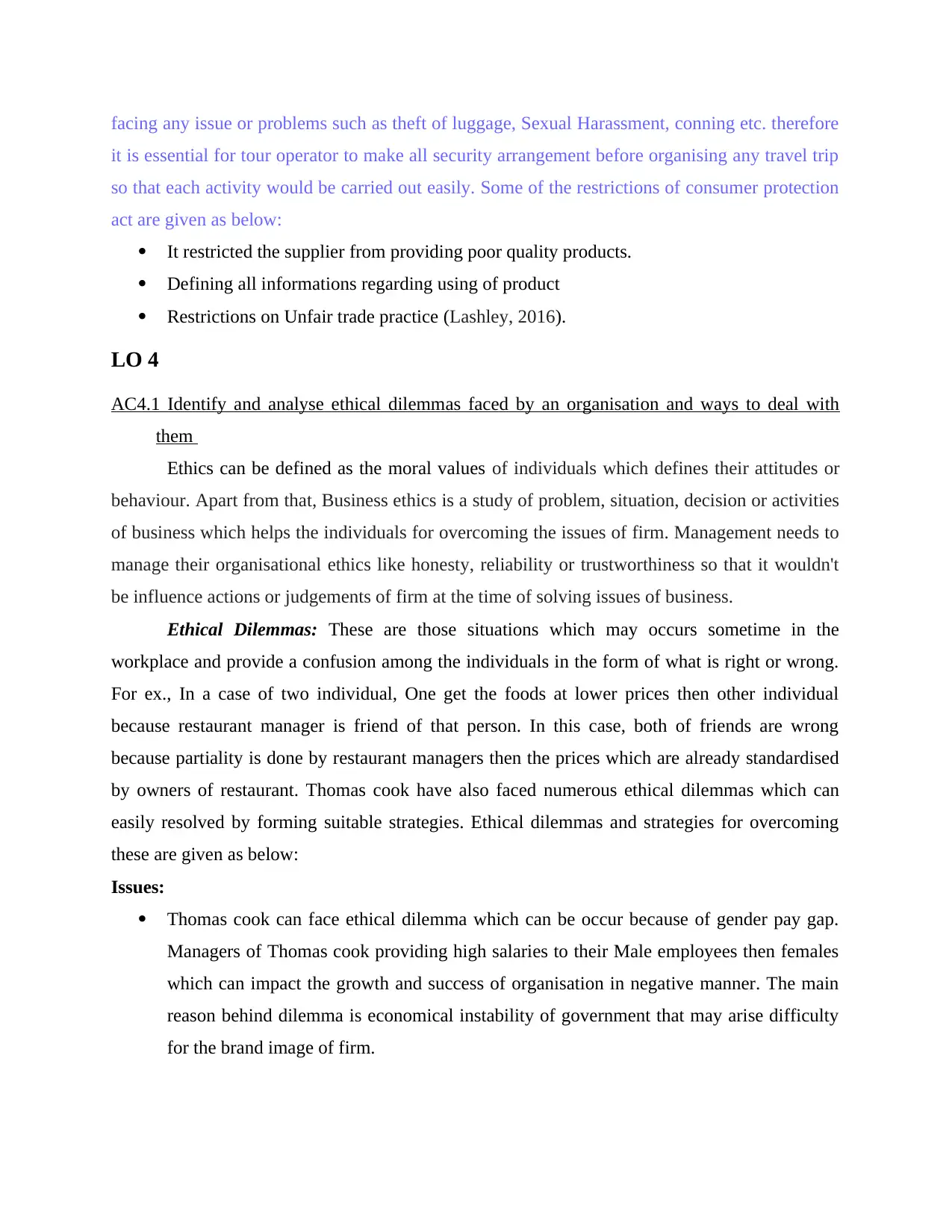
facing any issue or problems such as theft of luggage, Sexual Harassment, conning etc. therefore
it is essential for tour operator to make all security arrangement before organising any travel trip
so that each activity would be carried out easily. Some of the restrictions of consumer protection
act are given as below:
It restricted the supplier from providing poor quality products.
Defining all informations regarding using of product
Restrictions on Unfair trade practice (Lashley, 2016).
LO 4
AC4.1 Identify and analyse ethical dilemmas faced by an organisation and ways to deal with
them
Ethics can be defined as the moral values of individuals which defines their attitudes or
behaviour. Apart from that, Business ethics is a study of problem, situation, decision or activities
of business which helps the individuals for overcoming the issues of firm. Management needs to
manage their organisational ethics like honesty, reliability or trustworthiness so that it wouldn't
be influence actions or judgements of firm at the time of solving issues of business.
Ethical Dilemmas: These are those situations which may occurs sometime in the
workplace and provide a confusion among the individuals in the form of what is right or wrong.
For ex., In a case of two individual, One get the foods at lower prices then other individual
because restaurant manager is friend of that person. In this case, both of friends are wrong
because partiality is done by restaurant managers then the prices which are already standardised
by owners of restaurant. Thomas cook have also faced numerous ethical dilemmas which can
easily resolved by forming suitable strategies. Ethical dilemmas and strategies for overcoming
these are given as below:
Issues:
Thomas cook can face ethical dilemma which can be occur because of gender pay gap.
Managers of Thomas cook providing high salaries to their Male employees then females
which can impact the growth and success of organisation in negative manner. The main
reason behind dilemma is economical instability of government that may arise difficulty
for the brand image of firm.
it is essential for tour operator to make all security arrangement before organising any travel trip
so that each activity would be carried out easily. Some of the restrictions of consumer protection
act are given as below:
It restricted the supplier from providing poor quality products.
Defining all informations regarding using of product
Restrictions on Unfair trade practice (Lashley, 2016).
LO 4
AC4.1 Identify and analyse ethical dilemmas faced by an organisation and ways to deal with
them
Ethics can be defined as the moral values of individuals which defines their attitudes or
behaviour. Apart from that, Business ethics is a study of problem, situation, decision or activities
of business which helps the individuals for overcoming the issues of firm. Management needs to
manage their organisational ethics like honesty, reliability or trustworthiness so that it wouldn't
be influence actions or judgements of firm at the time of solving issues of business.
Ethical Dilemmas: These are those situations which may occurs sometime in the
workplace and provide a confusion among the individuals in the form of what is right or wrong.
For ex., In a case of two individual, One get the foods at lower prices then other individual
because restaurant manager is friend of that person. In this case, both of friends are wrong
because partiality is done by restaurant managers then the prices which are already standardised
by owners of restaurant. Thomas cook have also faced numerous ethical dilemmas which can
easily resolved by forming suitable strategies. Ethical dilemmas and strategies for overcoming
these are given as below:
Issues:
Thomas cook can face ethical dilemma which can be occur because of gender pay gap.
Managers of Thomas cook providing high salaries to their Male employees then females
which can impact the growth and success of organisation in negative manner. The main
reason behind dilemma is economical instability of government that may arise difficulty
for the brand image of firm.
Paraphrase This Document
Need a fresh take? Get an instant paraphrase of this document with our AI Paraphraser
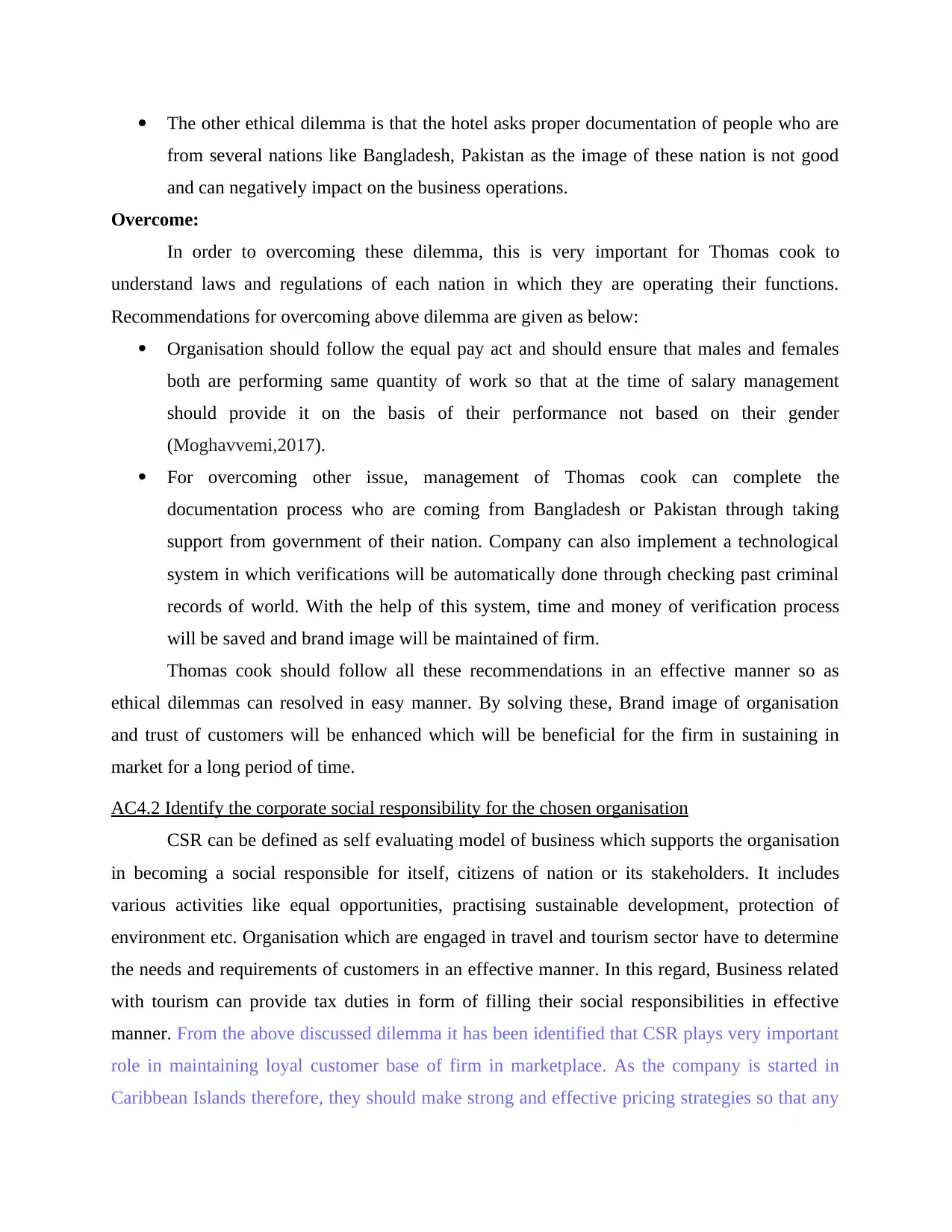
The other ethical dilemma is that the hotel asks proper documentation of people who are
from several nations like Bangladesh, Pakistan as the image of these nation is not good
and can negatively impact on the business operations.
Overcome:
In order to overcoming these dilemma, this is very important for Thomas cook to
understand laws and regulations of each nation in which they are operating their functions.
Recommendations for overcoming above dilemma are given as below:
Organisation should follow the equal pay act and should ensure that males and females
both are performing same quantity of work so that at the time of salary management
should provide it on the basis of their performance not based on their gender
(Moghavvemi,2017).
For overcoming other issue, management of Thomas cook can complete the
documentation process who are coming from Bangladesh or Pakistan through taking
support from government of their nation. Company can also implement a technological
system in which verifications will be automatically done through checking past criminal
records of world. With the help of this system, time and money of verification process
will be saved and brand image will be maintained of firm.
Thomas cook should follow all these recommendations in an effective manner so as
ethical dilemmas can resolved in easy manner. By solving these, Brand image of organisation
and trust of customers will be enhanced which will be beneficial for the firm in sustaining in
market for a long period of time.
AC4.2 Identify the corporate social responsibility for the chosen organisation
CSR can be defined as self evaluating model of business which supports the organisation
in becoming a social responsible for itself, citizens of nation or its stakeholders. It includes
various activities like equal opportunities, practising sustainable development, protection of
environment etc. Organisation which are engaged in travel and tourism sector have to determine
the needs and requirements of customers in an effective manner. In this regard, Business related
with tourism can provide tax duties in form of filling their social responsibilities in effective
manner. From the above discussed dilemma it has been identified that CSR plays very important
role in maintaining loyal customer base of firm in marketplace. As the company is started in
Caribbean Islands therefore, they should make strong and effective pricing strategies so that any
from several nations like Bangladesh, Pakistan as the image of these nation is not good
and can negatively impact on the business operations.
Overcome:
In order to overcoming these dilemma, this is very important for Thomas cook to
understand laws and regulations of each nation in which they are operating their functions.
Recommendations for overcoming above dilemma are given as below:
Organisation should follow the equal pay act and should ensure that males and females
both are performing same quantity of work so that at the time of salary management
should provide it on the basis of their performance not based on their gender
(Moghavvemi,2017).
For overcoming other issue, management of Thomas cook can complete the
documentation process who are coming from Bangladesh or Pakistan through taking
support from government of their nation. Company can also implement a technological
system in which verifications will be automatically done through checking past criminal
records of world. With the help of this system, time and money of verification process
will be saved and brand image will be maintained of firm.
Thomas cook should follow all these recommendations in an effective manner so as
ethical dilemmas can resolved in easy manner. By solving these, Brand image of organisation
and trust of customers will be enhanced which will be beneficial for the firm in sustaining in
market for a long period of time.
AC4.2 Identify the corporate social responsibility for the chosen organisation
CSR can be defined as self evaluating model of business which supports the organisation
in becoming a social responsible for itself, citizens of nation or its stakeholders. It includes
various activities like equal opportunities, practising sustainable development, protection of
environment etc. Organisation which are engaged in travel and tourism sector have to determine
the needs and requirements of customers in an effective manner. In this regard, Business related
with tourism can provide tax duties in form of filling their social responsibilities in effective
manner. From the above discussed dilemma it has been identified that CSR plays very important
role in maintaining loyal customer base of firm in marketplace. As the company is started in
Caribbean Islands therefore, they should make strong and effective pricing strategies so that any
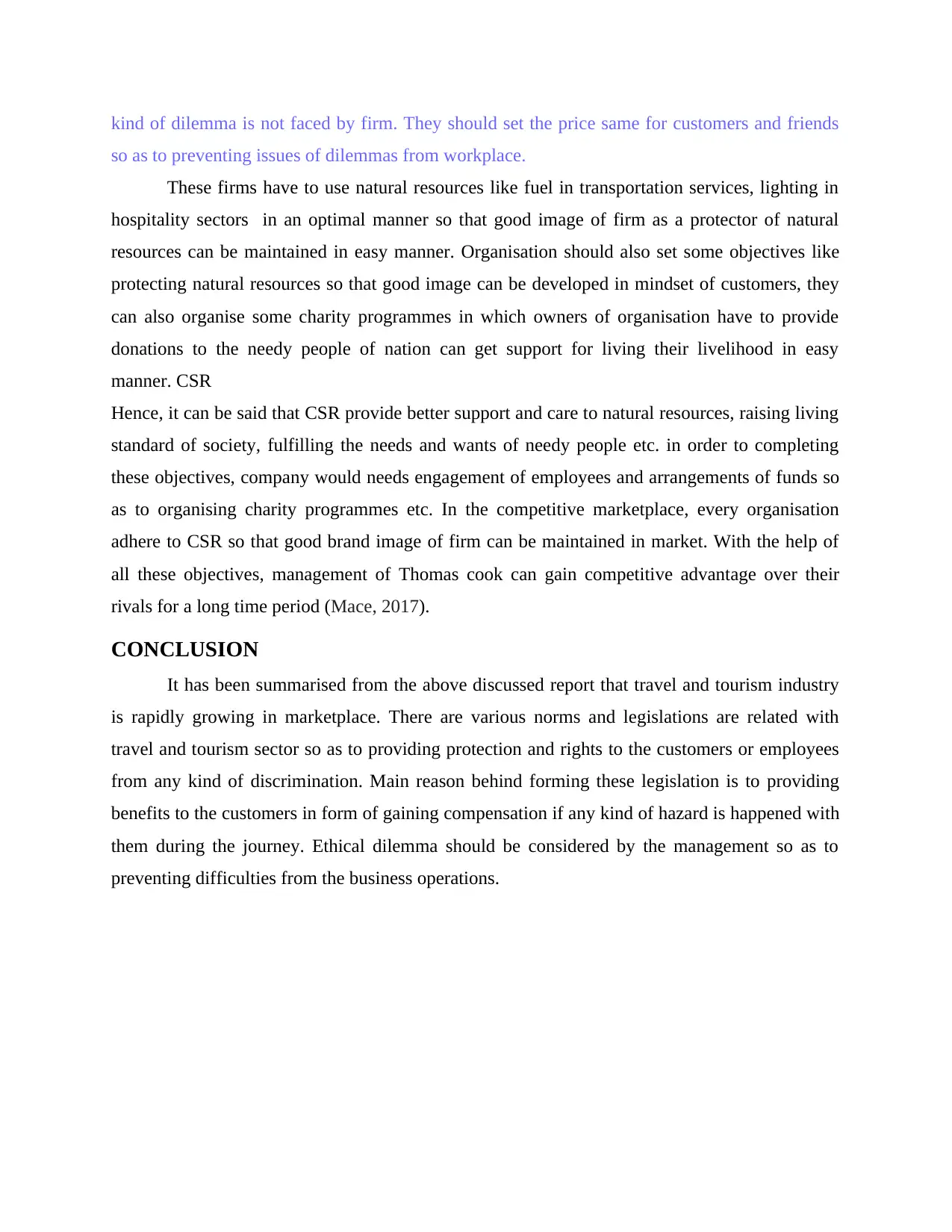
kind of dilemma is not faced by firm. They should set the price same for customers and friends
so as to preventing issues of dilemmas from workplace.
These firms have to use natural resources like fuel in transportation services, lighting in
hospitality sectors in an optimal manner so that good image of firm as a protector of natural
resources can be maintained in easy manner. Organisation should also set some objectives like
protecting natural resources so that good image can be developed in mindset of customers, they
can also organise some charity programmes in which owners of organisation have to provide
donations to the needy people of nation can get support for living their livelihood in easy
manner. CSR
Hence, it can be said that CSR provide better support and care to natural resources, raising living
standard of society, fulfilling the needs and wants of needy people etc. in order to completing
these objectives, company would needs engagement of employees and arrangements of funds so
as to organising charity programmes etc. In the competitive marketplace, every organisation
adhere to CSR so that good brand image of firm can be maintained in market. With the help of
all these objectives, management of Thomas cook can gain competitive advantage over their
rivals for a long time period (Mace, 2017).
CONCLUSION
It has been summarised from the above discussed report that travel and tourism industry
is rapidly growing in marketplace. There are various norms and legislations are related with
travel and tourism sector so as to providing protection and rights to the customers or employees
from any kind of discrimination. Main reason behind forming these legislation is to providing
benefits to the customers in form of gaining compensation if any kind of hazard is happened with
them during the journey. Ethical dilemma should be considered by the management so as to
preventing difficulties from the business operations.
so as to preventing issues of dilemmas from workplace.
These firms have to use natural resources like fuel in transportation services, lighting in
hospitality sectors in an optimal manner so that good image of firm as a protector of natural
resources can be maintained in easy manner. Organisation should also set some objectives like
protecting natural resources so that good image can be developed in mindset of customers, they
can also organise some charity programmes in which owners of organisation have to provide
donations to the needy people of nation can get support for living their livelihood in easy
manner. CSR
Hence, it can be said that CSR provide better support and care to natural resources, raising living
standard of society, fulfilling the needs and wants of needy people etc. in order to completing
these objectives, company would needs engagement of employees and arrangements of funds so
as to organising charity programmes etc. In the competitive marketplace, every organisation
adhere to CSR so that good brand image of firm can be maintained in market. With the help of
all these objectives, management of Thomas cook can gain competitive advantage over their
rivals for a long time period (Mace, 2017).
CONCLUSION
It has been summarised from the above discussed report that travel and tourism industry
is rapidly growing in marketplace. There are various norms and legislations are related with
travel and tourism sector so as to providing protection and rights to the customers or employees
from any kind of discrimination. Main reason behind forming these legislation is to providing
benefits to the customers in form of gaining compensation if any kind of hazard is happened with
them during the journey. Ethical dilemma should be considered by the management so as to
preventing difficulties from the business operations.
⊘ This is a preview!⊘
Do you want full access?
Subscribe today to unlock all pages.

Trusted by 1+ million students worldwide
1 out of 13
Related Documents
Your All-in-One AI-Powered Toolkit for Academic Success.
+13062052269
info@desklib.com
Available 24*7 on WhatsApp / Email
![[object Object]](/_next/static/media/star-bottom.7253800d.svg)
Unlock your academic potential
Copyright © 2020–2026 A2Z Services. All Rights Reserved. Developed and managed by ZUCOL.



